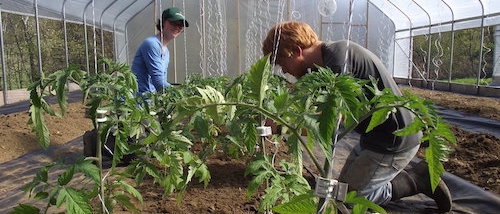FoodCorps, a new national service program, is accepting applications for its first class of service members. Those selected will dedicate one year of full-time public service in school food systems – sourcing healthful local food for school cafeterias, expanding nutrition education programs, and building and tending school gardens.
FoodCorps is a scalable solution to the national obesity epidemic. Since 1980, the percentage of American children who are overweight or obese has doubled. With one in four U.S. children struggling with hunger and one in three obese or overweight, FoodCorps addresses the root cause of both: access to healthy food.
“We’re on the lookout for hard-working young leaders who believe healthy food should be available to every child,” said Executive Director Curt Ellis. “Being part of FoodCorps is a chance to make that vision a reality for kids in this country—and to have fun in the process.”
FoodCorps seeks up to 80 young men and women with a passion for serving their country by building healthy communities. Beginning in August 2011, service members will get their hands dirty in one of 10 states: Arizona, Arkansas, Iowa, Maine,Massachusetts, Michigan, Mississippi, New Mexico, North Carolina or Oregon.
FoodCorps recognizes though broad in its reach, America’s obesity problem does not affect all parts of our country equally. First, there are geographic patterns to its severity. High rates of childhood obesity plague whole regions, particularly the American South: North Carolina 18%; Arkansas 20%; Mississippi 22%. Zooming in on a map of American obesity, there are also localized geographies in crisis: rural communities in Oregon where children are twice as likely to be overweight as their counterparts in healthy Portland; and small-town kids in Iowa who, despite living amidst the nation’s richest topsoil, lack regular access to the fresh fruits and vegetables required for a healthy diet.
In addition to geography, there are demographic and environmental patterns associated with the epidemic, including: 1) Ethnicity: in Michigan, 42% of African-American children are overweight or obese, compared with 28% of non-Hispanic Whites. In New Mexico, American Indian kindergarteners suffer obesity at three times the rate of non-Hispanic Whites. 2) Poverty: in Massachusetts, wealthy Arlington maintains a 10% childhood overweight and obesity rate, compared to 47% in impoverished Lawrence. In the Tohono O’odham Nation in Arizona, where annual per capita income is uniquely low––$8,100––rates of Type II diabetes, diagnosed in children as young as six, are estimated to be the nation’s highest. 3) Food Insecurity: in Maine, where 1 in 5 children are at risk of hunger (the highest rate in New England), a low-quality diet puts the same kids at heightened risk of obesity.
“Schools––their classrooms, cafeterias, and playgrounds––are the logical frontlines in our nation’s response to childhood obesity,” said Debra Eschmeyer, FoodCorps Program Director. “More than 31 million children eat school food five days a week, receiving more than half their daily calories from school food programs. What we feed our children, and what we teach them about food, affects how they learn, how they grow and how long they will live. Considering that when last studied, only 2% of schoolchildren met the USDA’s Dietary Guidelines for Americans, the nation’s school food environments have significant need for improvement.”
“We’ve heard from young people around the country interested in developing knowledge and skills in farming, food systems and public health,” said Cecily Upton, FoodCorps Program Director for Sites and Service. “FoodCorps will connect these young leaders with hands-on experience and the opportunity to change our food system for the better.”
Applications and more information can be found at www.foodcorps.org.
ABOUT FOODCORPS:
FoodCorps is a new national service organization that seeks to reverse childhood obesity by increasing vulnerable children’s knowledge of, engagement with, and access to healthy food. Service members build and tend school gardens, conduct nutrition education, and facilitate Farm to School programming that brings healthy, affordable local food into public schools. The program also trains a cadre of leaders for careers in food and agriculture. FoodCorps was developed with funding from AmeriCorps and the W.K. Kellogg Foundation, in partnership with Occidental College, the National Farm to School Network, Slow Food USA, The National Center for Appropriate Technology and Wicked Delicate, as part of an open planning process that engaged thousands of stakeholders from around the country. www.foodcorps.org
